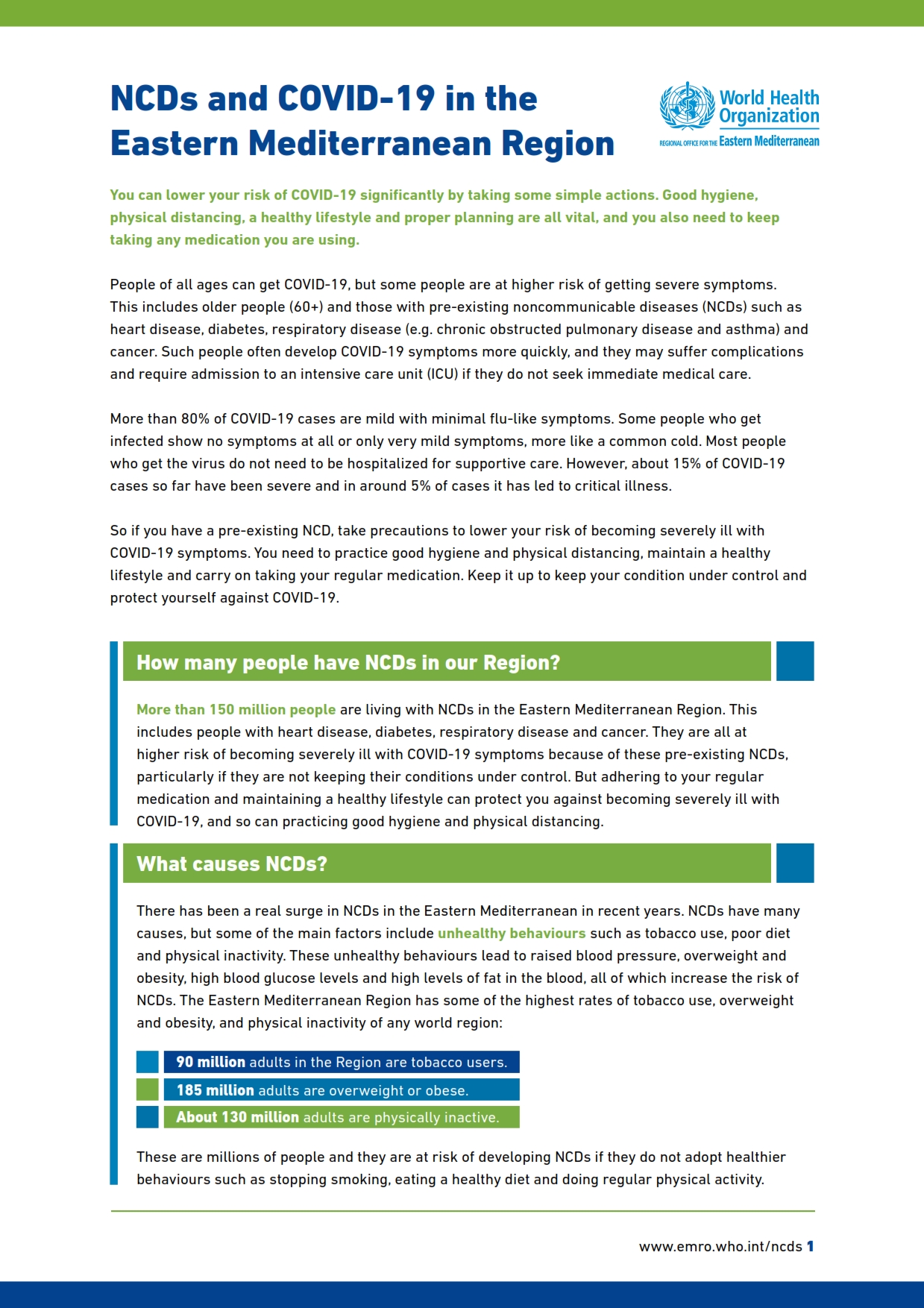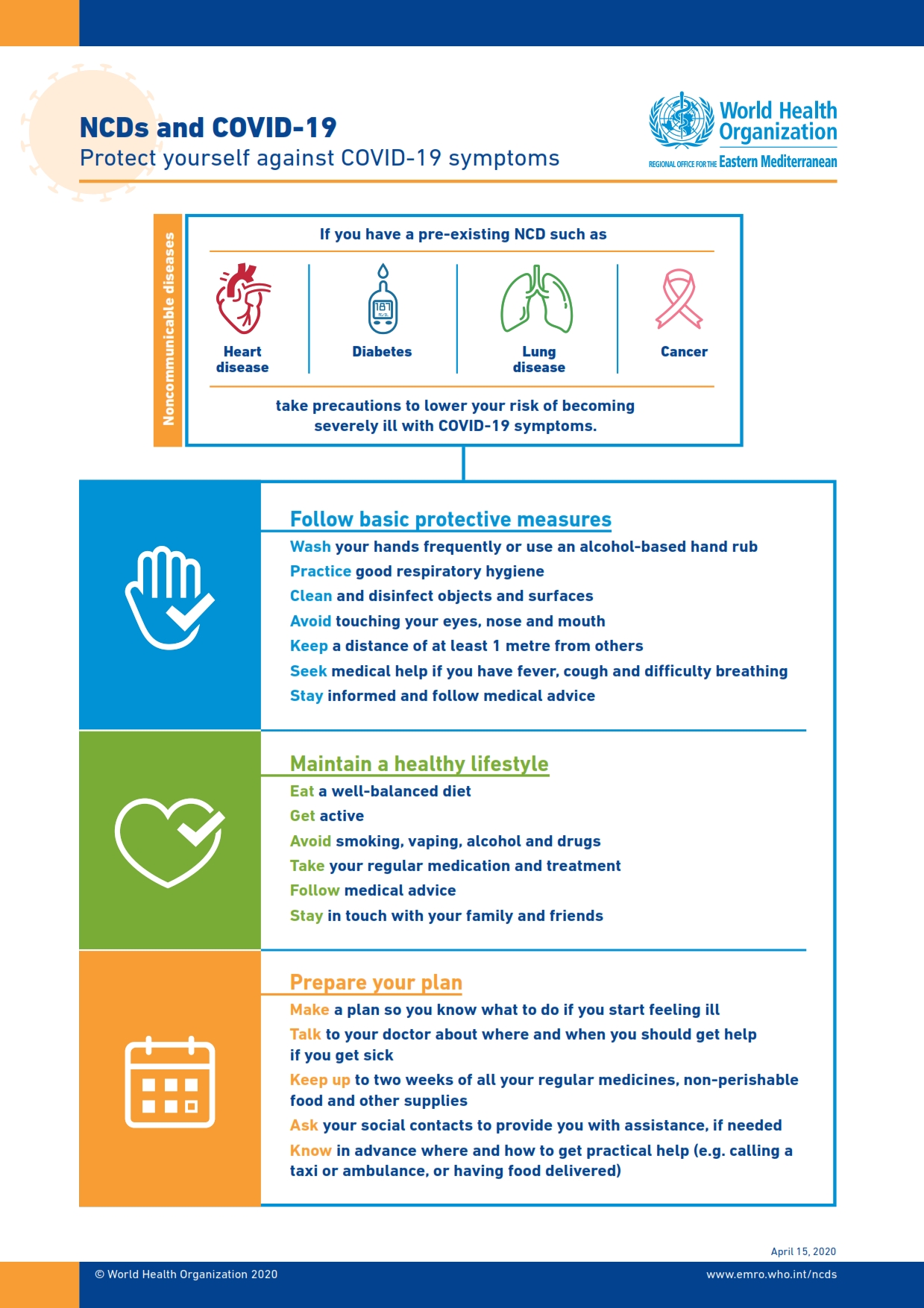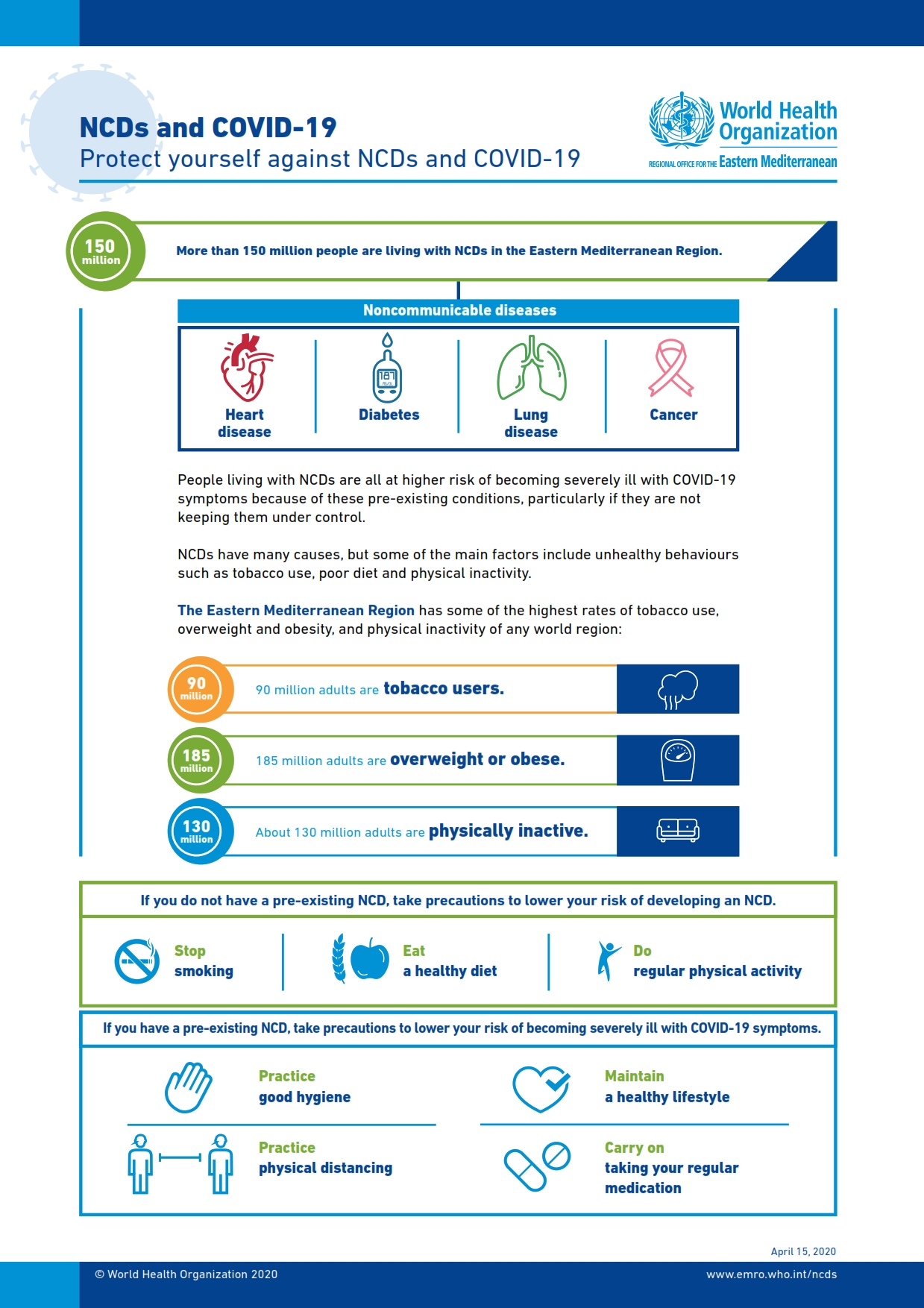You can lower your risk of COVID-19 significantly by taking some simple actions. Good hygiene, physical distancing, a healthy lifestyle and proper planning are all vital, and you also need to keep taking any medication you are using.
People of all ages can get COVID-19, but some people are at higher risk of getting severe symptoms. This includes older people (60+) and those with pre-existing noncommunicable diseases (NCDs) such as heart disease, diabetes, respiratory disease (e.g. chronic obstructed pulmonary disease and asthma) and cancer. Such people often develop COVID-19 symptoms more quickly, and they may suffer complications and require admission to an intensive care unit (ICU) if they do not seek immediate medical care.
More than 80% of COVID-19 cases are mild with minimal flu-like symptoms. Some people who get infected show no symptoms at all or only very mild symptoms, more like a common cold. Most people who get the virus do not need to be hospitalized for supportive care. However, about 15% of COVID-19 cases so far have been severe and in around 5% of cases it has led to critical illness.
So if you have a pre-existing NCD, take precautions to lower your risk of becoming severely ill with COVID-19 symptoms. You need to practice good hygiene and physical distancing, maintain a healthy lifestyle and carry on taking your regular medication. Keep it up to keep your condition under control and protect yourself against COVID-19.
How many people have NCDs in our Region?
More than 150 million people are living with NCDs in the Eastern Mediterranean Region. This includes people with heart disease, diabetes, respiratory disease and cancer. They are all at higher risk of becoming severely ill with COVID-19 symptoms because of these pre-existing NCDs, particularly if they are not keeping their conditions under control. But adhering to your regular medication and maintaining a healthy lifestyle can protect you against becoming severely ill with COVID-19, and so can practicing good hygiene and physical distancing.
What causes NCDs?
There has been a real surge in NCDs in the Eastern Mediterranean in recent years. NCDs have many causes, but some of the main factors include unhealthy behaviours such as tobacco use, poor diet and physical inactivity. These unhealthy behaviours lead to raised blood pressure, overweight and obesity, high blood glucose levels and high levels of fat in the blood, all of which increase the risk of NCDs. The Eastern Mediterranean Region has some of the highest rates of tobacco use, overweight and obesity, and physical inactivity of any world region:
90 million adults in the Region are tobacco users.
185 million adults are overweight or obese.
About 130 million adults are physically inactive.
These are millions of people and they are at risk of developing NCDs if they do not adopt healthier behaviours such as stopping smoking, eating a healthy diet and doing regular physical activity.
I have a pre-existing NCD. What can I do to lower my risk from COVID-19?
Follow basic protective measures
Wash your hands frequently with soap and water or use an alcohol-based hand rub to kill the virus that may be on your hands.
Practice good respiratory hygiene by covering your mouth and nose with your bent elbow or tissue when you cough or sneeze. If you use a tissue, dispose of it immediately afterwards.
Clean and disinfect objects and surfaces you touch frequently to kill the virus that may be on those surfaces.
Avoid touching your eyes, nose and mouth because hands can pick up the virus from any surfaces they touch.
Keep a distance of at least 1 metre from anyone who is coughing or sneezing to avoid getting sprayed with liquid droplets from their nose or mouth which may contain the virus.
If you have fever, cough and difficulty breathing, seek medical help as soon as possible.
Stay informed and follow advice given by your health care provider to protect yourself and others from COVID-19.
Maintain a healthy lifestyle
Eat a well-balanced diet based on fresh and unprocessed foods to improve your health and strengthen your immune system.
Get active to improve your health and well-being.
Quit tobacco smoking because your lungs may already be compromised, which greatly increases your risk of serious COVID-19 symptoms.
Take your regular medication and treatment, and follow medical advice.
Stay in touch with your family and friends and avoid harmful coping strategies like smoking, vaping, alcohol and drugs.
Prepare your plan
Make a plan now so that you know what to do in case you start feeling ill with possible COVID-19 symptoms.
Talk to your doctor about where and when you should get help if you get sick.
Make sure you keep up to two weeks of all the regular medicines you may require, as well as non-perishable food and other supplies to minimize trips outside your home.
Ask your social contacts to provide you with assistance, if needed.
• Make sure you know in advance where and how to get practical help if you need it, for example calling a taxi or ambulance, or having food delivered.
What can health care providers do for people with pre-existing NCDs who get COVID-19?
Understand your patient’s condition so that you can tailor the management of COVID-19 and their chronic illness.
Communicate early and proactively with the patient and their family to inform them about what they need to do and provide advice.
Determine which medications should be continued and which should be stopped temporarily.
Discuss and identify the patient’s values and preferences regarding medical interventions and treatment.
I have a pre-existing NCD. Should I fast during the COVID-19 pandemic?
If you have type 1 diabetes, you are generally advised not to fast. If you have type 2 diabetes and hypertension and have these conditions under control, either through diet or medication, you may be able to fast. However, you should refer to your doctor or dietitian for the right advice based on your situation.
Counselling and psychosocial support
While good hygiene, physical distancing, a healthy lifestyle and proper planning are all vital for people with pre-existing NCDs to lower their risk of becoming severely ill with COVID-19 symptoms, they are not magic solutions. People living with NCDs may need support with their mental health and well-being to ensure they keep in good health, especially if their conditions are not under control. Seek counselling and psychosocial support from appropriately trained health care professionals and also community-based lay and peer counsellors.
Factsheet and infographics
Sources
Characteristics of COVID-19 patients dying in Italy: report based on available data on March 20th, 2020. Rome: COVID-19 Surveillance Group; 2020.
COVID-19 and diabetes [website]. Brussels: The International Diabetes Federation; 2020 (https://www.idf.org/aboutdiabetes/what-is-diabetes/covid-19-and-diabetes.html).
Dietary recommendations for the month of Ramadan. In: Nutrition [website]. Cairo: World Health Organization Regional Office for the Eastern Mediterranean; 2018 (www.emro.who.int/nutrition/nutrition-infocus/dietary-recommendations-for-the-month-of-ramadan.html).
Global Cancer Observatory [website]. Lyon: International Agency for Research on Cancer; 2018 (https://gco.iarc.fr).
Guan WJ, Ni ZY, Hu Y, Liang WH, Ou CQ, He JX, et al. Clinical characteristics of coronavirus disease 2019 in China. New England Journal of Medicine. 2020.
Liang W, Guan W, Chen R, Wang W, Li J, Xu K, et al. Cancer patients in SARS-CoV-2 infection: a nationwide analysis in China. The Lancet Oncology. 2020;21(3):335-7.
Liu W, Tao ZW, Lei W, Ming-Li Y, Kui L, Ling Z, et al. Analysis of factors associated with disease outcomes in hospitalized patients with 2019 novel coronavirus disease. Chinese Medical Journal. 2020.
NCD mortality and morbidity. In: Global Health Observatory data [website]. Geneva: World Health Organization; 2016 (https://www.who.int/gho/ncd/mortality_morbidity).
Prevalence of insufficient physical activity among adults: data by WHO region. In: Global Health Observatory repository [website]. Geneva: World Health Organization; 2016 (https://apps.who.int/gho/data/view.main.2482?lang=en).
Prevalence of overweight among adults, BMI ≥ 25, age-standardized: estimates by WHO region. In: Global Health Observatory repository [website]. Geneva: World Health Organization; 2016 (http://apps.who.int/gho/data/view.main.GLOBAL2461A?lang=en).
Raised blood pressure (SBP ≥ 140 OR DBP ≥ 90), age-standardized (%): estimates by WHO region. In: Global Health Observatory repository [website]. Geneva: World Health Organization; 2016 (http://apps.who.int/gho/data/view.main.NCDBPAREGv?lang=en).
Raised fasting blood glucose (≥ 7.0 mmol/L or on medication) (age-standardized): estimates by WHO region. In: Global Health Observatory repository [website]. Geneva: World Health Organization; 2016 (http://apps.who.int/gho/data/view.main.NCDRGLUCAv?lang=en).
Report of the WHO-China Joint Mission on Coronavirus Disease 2019 (COVID-19). Geneva: World Health Organization; 2020.
Wang D, Hu B, Hu C, Zhu F, Liu X, Zhang J, et al. Clinical characteristics of 138 hospitalized patients with 2019 novel coronavirus-infected pneumonia in Wuhan, China. JAM. 2020.
WHO global report on trends in prevalence of tobacco use 2000-2025, third edition. Geneva: World Health Organization; 2019.






